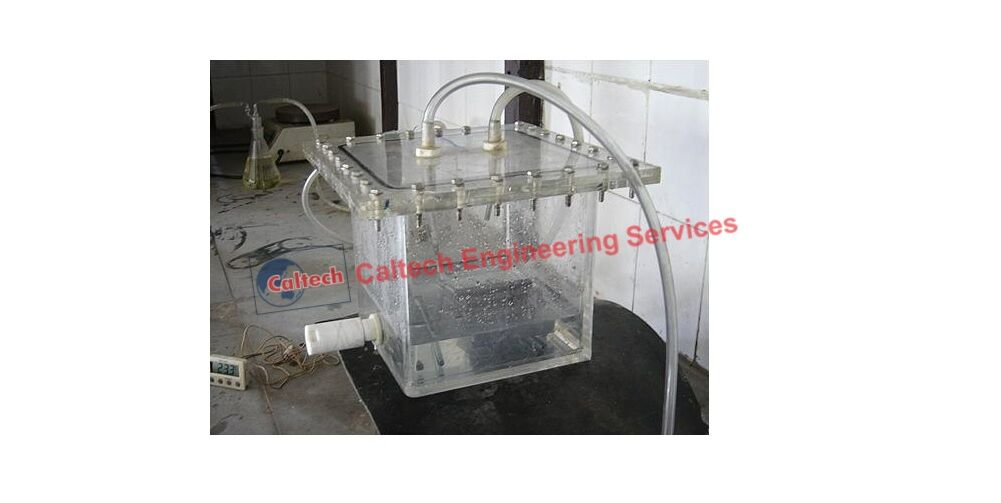Caltech India India is one of the leading HIC Test manufacturers, producing hydrogen induced cracking testing apparatus (HIC test) to test and accurately determine the hydrogen induced cracking over exposed test specimens as per NACE standard requirements.
HIC test is carried in carbon steel and low alloy steel metal plates, pipe and welded pipes in nace corrosion test.
HIC testing is recommended to evaluate the resistance of welded pipeline and pressure vessel plate steels to hydrogen induced cracking corrosion caused by hydrogen absorption from aqueous sulphide corrosion.
Unstressed test specimens are exposed to a solution at temperature of 25º cent with continuous H2S gas flow. The presence of hydrogen in the weld metal or HAZ may lead to a form of cracking known as hydrogen-induced cracking (HIC). The test specimens are finally removed and evaluated. Tested samples are used to compute the values in percentage for Crack Length Ratio (CLR), Crack Thickness Ratio (CTR) and Crack Sensitivity Ratio (CSR) Test specimens determine susceptibility of metals in H2S service. HIC testing apparatus meet requirements of ASTM / NACE Standard TM0284 and suitable to test material as per requirements of NACE MR0175.
Hydrogen induced cracking test apparatus is rectangular provided with ready to use connections fittings. HIC test apparatus is supplied with essential spares for uninterrupted long-term testing. HIC test specimens are machined with thickness of 5-30mm, width 20mm, and length of 100mm is suitable for testing as per the NACE Standard. Hydrogen induced cracking test instrument is supplied with standard size of 12” (L) x 12” (W) x 9” (H). HIC testing apparatus is provided with specially made rack to keep the samples with minimum surface contact and all the specimens can be viewed during the test period easily.
At the option of customer, we also supply custom size apparatus with spare glassware’s, tubing, and accessories.
HIC test apparatus is suitable for standard environment chamber is machined from clear, durable Perspex / acrylic to permit instant visual observation of the specimen at all times. Glass with acrylic is also available at option of user. O-ring seals are provided to prevent any leakages from test apparatus. Individual test apparatus are tested with Hydro Test of Air before dispatch. Each HIC testing apparatus has one inlet, one outlet and one plug to remove test solution or conduct potassium iodometric test as per the standard to verify concentration of test solution.
What is hydrogen induced cracking? Refer NACE Standard TM0284.
All the test apparatus are manufactured to provide interchangeable connections and fittings. It complies with requirements of TM0284. Purpose of HIC test procedure is to study hydrogen induced cracking mechanism. HIC test apparatus is suitable to use NACE TM0284 specified Solution A or Solution B. Solution A is acidified brine. Solution B is simulated seawater prepared in accordance with ASTM D1141. In either case, H2S is bubbled through the solution constantly throughout the test period. NACE TM0284 specifies test duration of 96 hours. The test requires evaluation of pH values of the test solution before exposure and after the exposure. HIC test specimens are cut into sections and examined under a microscope for hydrogen-induced corrosion cracks. The dimensions of any such cracks are recorded and used to compute the values in percentage for Crack Length Ratio (CLR), Crack Thickness Ratio (CTR) and Crack Sensitivity Ratio (CSR) as per the NACE Standard. We are also able to provide spares, HIC test procedures of all the items within shortest time.
Hydrogen induced cracking corrosion testing ( HIC Test ) made easy using Caltech’s HIC Testing Apparatus.
Alongside being one of the leading HIC test manufacturers, we also manufacture and supply SSC Test Proof Ring, 4 point bend SSC Test, SOHIC Ring Test Apparatus.
In India, we have various customers from Mumbai, Delhi, Bangalore, Chennai, Hyderabad, Ahmedabad, Kolkata, Surat, Pune, Jaipur, Lucknow, Kanpur, Nagpur, Visakhapatnam, Indore, Bhopal, Patna, Vadodara, Ghaziabad, Ludhiana, Coimbatore, Madurai, Nashik, Srinagar, Aurangabad, Dhanbad, Allahabad and Ranchi in India.
